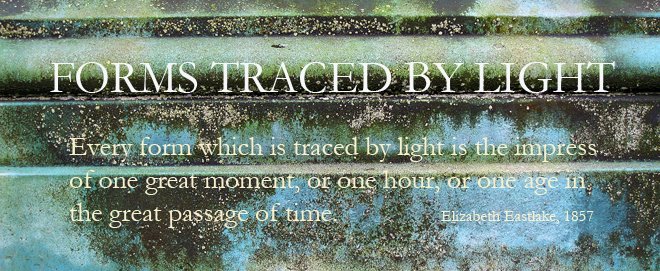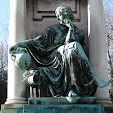Beforehand, in the front hall: the spray of flowers (with rosemary from the garden) that Alice and I placed on Ray's coffin, together with his naval cap (which he carried on wearing, forever), and the bag containing the Order of Service. You'll note the fox. It's also a bag that one can cut up into little pieces, and plant, and then the wild flowers seeds with which it's impregnated will grow. Wildflower seeds for planting were given out after the funeral, too ...
And: when we came out, after the service, the sun was, very briefly, shining: that was nothing short of a small miracle.
Here's the eulogy that I delivered for Ray: it followed a spirited rendition of "For All the Saints".
Ray always liked a good sing. He’d have enjoyed that.
How to sum up someone who lived into their hundredth year? – a fact that both delighted and amazed Ray. The details can be set out clearly enough. Ray was born in 1923 in Beeston, Leeds: long enough ago for him to remember the first motorized vehicle coming to their cobbled street. His father Joe died when Ray was four, and he and his older brother Don were brought up by their mother Gladys. There was hardly any money – Gladys had to go out cleaning houses, and throughout his life, Ray had admiration and compassion for those who soldier on through tough circumstances. But his was a loving family, and Ray, Don and their mother ended up living with her parents and sister in Kings Heath, Birmingham.
Ray’s life would not have taken the direction it did without World War Two. A family friend told him that Birmingham University was offering an accelerated, two-year engineering degree for those who would then take their skills into the armed services, and Ray was assigned to the Fleet Air Arm, on the aircraft carrier HMS Vengeance, helping look after the Corsairs. Many of you will have heard the story that speaks to his enterprise and resilience as a twenty-two year old, chasing the ship he had to join from England, to Malta, round the North African part of the Mediterranean to Egypt to India’s west coast, across India to what was then Ceylon, and then back to Madras. On board Vengeance, at last, he sailed to Australia, back up to Japan, and then to Hong Kong – always, happily, just behind the action.
While still a student at Birmingham, Ray met my mother, Joy, at a dance in the Student Union. Her studies at Oxford were interrupted by the war: she resumed them in 1947, the year in which they married. By this time, Ray had been accepted to read for a second degree, in Law, at St Catherine’s, Oxford – something that he financed through his full-time job (unrevealed to the College) working for the City’s planning department. After a few short-term positions, he joined the big construction firm George Wimpey as an engineering estimator in 1956; moved up the hierarchy to become managing quantity surveyor, and eventually a Director of the Mechanical, Engineering, and Chemical Division. Retiring from Wimpey in his early sixties, he worked as an independent consultant.
But less important to Ray than the work itself, I think, were the opportunities it gave him, especially for travel and for meeting people. When I was born, in 1954, we lived in a flat at the top of Copse Hill. Three years later, when Ray was sent to Wimpey’s site at Spadeadam – situated in a wild part of northern Cumberland, where the rockets that would launch Britain’s Polaris missiles were being built – and he looked for somewhere reasonably priced to rent. My mother and I joined him, late in 1957, in the Morpeth Tower of Naworth Castle – an extraordinary and wonderful place to spend three and a bit years, and somewhere that offered endless opportunities for his practical inventiveness. How do you sweep the chimney in a castle? Ray went and cut down a very spiky gorse bush, and he pulled it down into the fireplace on a thin rope. He and my mother scoured O’Hara’s, the junk shop in Brampton, the local town, for cheap antique furniture that he then lovingly restored; he bought old clocks there and in auctions – he had a passion for clocks, and making them work again; we went off exploring on Sundays in his beloved Triumph Mayflower, to Hadrian’s Wall or down roads designated “Unpassable to Motor Vehicles” – a sign that was like catnip to him.
And he also worked on his architectural plans for 20 Hillside. Back in 1957, he bought the plot of land that had been part of Allenho’s orchard, and then, when we knew that we’d be moving back to London in early 1961, he hired a firm of builders to put up the house, carefully supervising their work: I remember climbing all over it with him while he explained the importance of load-bearing walls, and mortise and tenon wood joints. Over the years, he continued working on the house: installing the central heating; having the dining room built out into the increasingly lovely garden in the 1990s. This was the base to which he returned from his work travels, which included a long period in Bucharest supervising the construction of a hydro-electric dam that the Romanians tried to pay for in tomatoes; plenty of trips to the Middle East - woe betide you if you couldn’t name all seven Emirates that make up the UAE. After he left Wimpey in 1986, he had spells working in Texas, and master-minding a charity drive round the States to raise money for Esther Rantzen’s Child Line.
But the outline of Ray’s life events hardly begins to convey his essence. He was intimidatingly multi-talented: he could have made a career as a commercial artist (indeed, he was heading in that direction before the war), and he was as expert in watercolour as in wood engraving; in oil painting as in calligraphy – indeed, he made extra income, in Oxford, doing the lettering and scrolls on all those formal college photographs. He made furniture out of discarded wood and other materials – no skip was safe from him. He had a rich and lovely singing voice, and all his life could remember all the words to songs that he used to sing round the family piano in Birmingham, or in the Navy. He hugely enjoyed the opportunity to perform in an amateur production of La Traviata at Covent Garden. Ray could also recite verses and verses of poetry – Hardy, and Housman, and Kipling – and yes, he wrote it, too. And he also was proud of his letters that were published in The Times, from a definitive explanation of why bicycles stay upright when you pedal, to his inquiry: “if the Euro achieves parity with the dollar, will it then be called the ‘douleur’?” Ray loved puns. He loved collecting coincidences in his life, which formed part of his extensive repertoire of anecdotes. And annually, he took pride in his pots of homemade marmalade – he produced jars of chutney, as well; froze gallons of blackberries from the garden; and when we lived in Cumberland, made blackberry, gooseberry, elderflower, and some disastrously explosive rhubarb wine.
Ray was a man who felt passionately about things – not all of them positive. He loathed bureaucrats in Brussels, electronically amplified music, and inefficiency, rudeness, and poor workmanship. But he put enormous stock in happiness, and cherished things that made him happy: finding a bargain; certain pieces of art work; visits from small children; a succession of cats – Rama, Sam, Hal, and Simba; Paddington Bear meeting the Queen; and above all, the garden, with its magnolia tree, its rose bushes, its poppies, the climbing plants that grew up the house’s back wall, the pots full of bulbs, and its animals and birds, too. In summer, he would take his pint and his pipe and a book out there – either Victorian fiction or a whodunnit; in winter, the space for his quiet time was the garage, which he’d recently learned to call his man hut. He particularly enjoyed Dickens: I bet he’s quizzing him right now about how Edwin Drood was going to end.
Very many of you here today helped to celebrate Ray’s 99th birthday with him just a few weeks ago. In the speech that he gave, he emphasized two things in particular: how lucky he had been throughout his life; and the importance of friendship to him. Some of those most important relationships were with those who have gone before: in order of their parting, his good schoolfriend and best man, Jim Hull; his beloved brother, Don; his dear friend Marion O’Brien, and my mother, Joy. But he also loved his Hillside neighbours, and I’ve been so touched by the reminiscences that you’ve been sharing. There can hardly have been a house in the street for whom he hasn’t been a keyholder at one time or another – or whose gate he hasn’t mended. And he loved to share a drink with you, and to come to parties: as you know, he was always among the last to leave. I look forward to continuing his true enjoyment in conviviality when we come together to celebrate his life after this service.




Dear Kate, Thank you so much for posting your beautifully written and delivered eulogy, capturing a life well lived over 99 years, an amazing achievement in itself. I was going to ask you for a copy because there was so much in it to think about and remember. This afternoon was a very fitting send off for Ray and I feel privileged to have been a part of it. Thank you.
ReplyDeletethank you so much, Gaynor! It was so good to see you and Ellie - of course, not nearly enough time to talk, but it was a great send-off, I thought!
DeleteSo beautiful Kate! A terrific evocation of a man of tremendous resourcefulness, energy, and appreciation of life! What a force of nature! You homor him and yourself!
ReplyDeletethank you so very much, Alice - I wish you could have known him: you'd have got on really well ... xxx
DeleteThank you for sharing your beautiful eulogy. Ray lived an inspiring, artistically rich, and full life. I'd love to see more examples of his art and calligraphy!
ReplyDeleteI will see what I can do! Thank you so much, WG & co ...
ReplyDelete